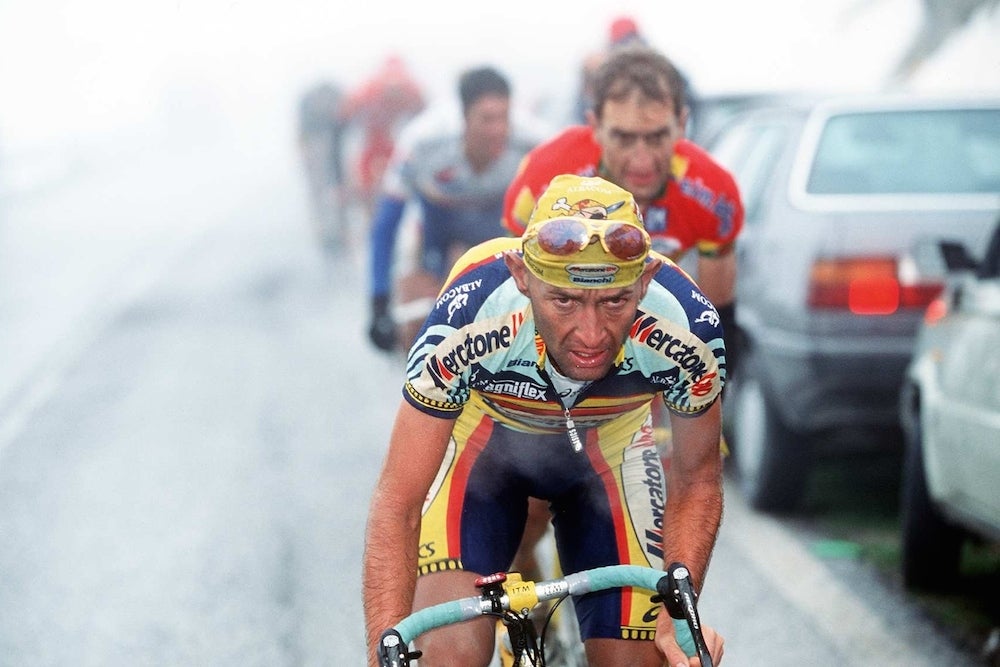Pantani's Giro ban examined, Gotti 'ready to concede' 1999 Giro

Marco Pantani (Mercatone Uno) was poised to win the 1999 Giro d'Italia ahead of Ivan Gotti (Polti). But he was expelled from the race before the final mountain stage after a doping test. Photo: Tim De Waele | <a href="http://tdwsport.com" target="_blank">TDWsport.com</a>
MILAN (VN) — Ivan Gotti is ready to give up his 1999 Giro d’Italia win if a new investigation centered on Marco Pantani’s expulsion from that race shows foul play linked to the mafia.
“I’ll accept the decision that arrives,” Gotti told Italy’s Il Tempo newspaper Tuesday.
“Rewriting the story is not a problem in respect to what happened to poor Marco. If they were to assign him that Giro, I would not feel privy to anything. I’m ready to concede.”
The 45-year-old Italian from Bergamo won the 1999 Giro by 3:35 over Paolo Savoldelli and by 3:36 over Gilberto Simoni. It was his second Giro win after his 1997 victory. He also placed fifth overall at the 1995 Tour de France.
The 1999 win came under a cloud of scandal as Pantani, winner of the 1998 Giro and Tour the year before, was excluded the morning before the final mountain stage, following an anti-doping test.
Pantani won the Madonna di Campiglio stage on June 4 and held the race leader’s pink jersey by 5:38 over Savoldelli and 6:12 over Gotti. Before he could leave the ski village the next morning, June 5, testers checked his hematocrit level. His blood showed 51.9 percent — above the 50 percent limit — indicating use of EPO, a banned blood-booster drug.
“Il Pirata” had to sit out two weeks. He returned to win two stages in the 2000 Tour de France, but those were his last two victories as he faded from competition and died due to cocaine overdose on February 14, 2004.
History could be rewritten, however. The public prosecutor in Forlì, in the region of Emilia-Romagna near Pantani’s home in Cesena, is examining if the mafia and sports fixing had a hand in Pantani’s exclusion that morning. Already, Prosecutor Sergio Sottani called career criminal Renato Vallanzasca. Vallanzasca said over the years that the Camorra [an Italian crime syndicate] was involved, and in 1999, he was warned against betting on Pantani’s win.
Romano Cenni, head of the Mercatone Uno company that sponsored Pantani’s 1999 team, has heard enough and already hired a lawyer to push for changes. He wants the overall classification to be rewritten to how it stood the evening Pantani won at Madonna di Campiglio, and he wants winner’s pink jersey from Gotti.
“I cannot say if it was a conspiracy, an error, or other circumstances, but what I am sure of is that new facts are emerging that, together with those already assessed, demonstrate that the decision taken in respect of Marco Pantani, and team Mercatone Uno, should be amended and revised,” Marco Baroncini, Cenni’s lawyer, told Italy’s TGCOM television.
“Mercatone Uno, and in particular its president, Romano Cenni, would like that Pantani is given back what was unjustly taken away.”
Cenni and his lawyer will be able to draw on the evidence of the criminal inquiry in Forlì for their sporting case. They will likely have to wait until the inquiry closes to begin their push for Gotti’s pink jersey.
At the same time, just 33 miles away in Rimini, a separate investigation is looking into the possibility that Pantani was murdered. Pantani’s family hired a lawyer that argues that men forced their way into Pantani’s hotel room and made him to drink water diluted with lethal amounts of cocaine against his will.
Any sporting case will look at the outcomes of the Forlì and Rimini investigations, and back over Pantani’s career. Besides two previous cocaine overdoses, Pantani’s hematocrit read high, 60.1 percent, after a crash in the 1995 Milano-Torino and his urine collected en route to the 1998 Tour win showed evidence of EPO according to a 2013 French senate report.